
Candida Martinelli's Italophile Site

Main
Page This family-friendly site celebrates Italian culture for the enjoyment of children and
adults. Site-Overview
Natural
musicality of Italians
Comments on the Italian style of performance known as Commedia
dell'Arte, in which the back-stage is not hidden from the audience, and
the strength of the play rests solely on shoulders of the actors. One
night at the little theatre in Padua, the ticket-seller gave us the
stage-box (of which he made a great merit), and so we saw the play and
the byplay. The prompter, as noted from our point of view, bore a chief
part in the drama (as indeed the prompter always does in the Italian
theatre), and the scene-shifters appeared as prominent characters. We could
not help seeing the virtuous wife, when hotly pursued by the villain of
the piece, pause calmly in the wings, before rushing, all tears and
desperation, upon the stage; and we were dismayed to behold the injured
husband and his abandoned foe playfully scuffling behind the scenes. All the
shabbiness of the theatre was perfectly apparent to us; we saw the
grossness of the painting and the unreality of the properties. And yet I
cannot say that the play lost one whit of its charm for me, or that the
working of the machinery and its inevitable clumsiness disturbed my
enjoyment in the least. There
was so much truth and beauty in the playing, that I did not care for the
sham of the ropes and gilding, and presently ceased to take any note of
them. The illusion which I had thought an essential in the dramatic
spectacle, turned out to be a condition of small importance. (ed.
Visit my Commedia dell'Arte page for more on
this very entertaining theatrical style.) You hear
the airs (ed. arias) of opera sung as commonly upon the streets in
Venice as our own colored melodies at home; and the street-boy when he
sings has an inborn sense of music and a power of execution which put to
shame the cultivated tenuity of sound that issues from the northern
mouth--"That frozen, passive, palsied breathing-hole."
Comments on Venetian theatre and the theatre
going public I have
seen excellent acting at the Venetian theatres, both in the modern
Italian comedy, which is very rich and good, and in the elder plays of
Goldoni--compositions deliciously racy when seen in Venice, where alone
their admirable fidelity of drawing and coloring can be perfectly
appreciated. The best
comedy is usually given to the educated classes at the pretty Teatro
Apollo, while a bloodier and louder drama is offered to the populace at
Teatro Malibran, where on a Sunday night you may see the plebeian life
of the city in one of its most entertaining and characteristic phases. The
sparings (ed. remaining money) of the whole week which have not been
laid out for chances in the lottery, are spent for this evening's
amusement; and in the vast pit you see, besides the families of
comfortable artisans who can evidently afford it, a multitude of the
ragged poor, whose presence, even at the low rate of eight or ten soldi
apiece, it is hard to account for. The
auditors wear their hats in the pit, but deny that privilege to the
people in the boxes, and raise stormy and wrathful cries of cappello!
till these uncover. Between acts, they indulge in excesses of water
flavored with anise, and even go to the extent of candied nuts and
fruits, which are hawked about the theatre, and sold for two soldi the
stick,--with the tooth-pick on which they are spitted thrown into the
bargain.
Comments
on the Marionette theatre of Venice ... the
one entertainment which never fails of drawing and delighting full
houses is the theatre of the puppets, or the Marionette, and thither I
like best to go. The Marionette prevail with me, for I find in the
performances of these puppets, no new condition demanded of the
spectator, but rather a frank admission of unreality that makes every
shadow of verisimilitude delightful, and gives a marvelous relish to the
immemorial effects and traditionary tricks of the stage. The
little theatre of the puppets is at the corner of a narrow street
opening from the Calle del Ridotto, and is of the tiniest dimensions and
simplest appointments. There are no boxes--the whole theatre is
scarcely larger than a stage-box--and you pay ten soldi to go into the
pit, where you are much more comfortable than the aristocrats who have
paid fifteen for places in the dress-circle above. The
stage is very small, and the scenery a kind of coarse miniature
painting. But it is very complete, and every thing is contrived to
give relief to the puppets and to produce an illusion of magnitude in
their figures. They are
very artlessly introduced, and are maneuvered, according to the
exigencies of the scene, by means of cords running from their heads,
arms, and legs to the top of the stage. To the management of the
cords they owe all the vehemence of their passions and the grace of
their oratory, not to mention a certain gliding, ungradual locomotion,
altogether spectral. In the commedia
a braccio, before mentioned as the inheritance of the Marionette,
the dramatist furnished merely the plot, and the outline of the action;
the players filled in the character and dialogue. With any people
less quick-witted than the Italians, this sort of comedy must have been
insufferable, but it formed the delight of that people till the middle
of the last century, and even after Goldoni went to Paris he furnished
his Italian players with the commedia a braccio.
Comments
on theatrical plays in Venice at the time, especially those of Goldoni I have
heard some very passable gags at the Marionette, but the real commedia
a braccio no longer exists, and its familiar and invariable
characters perform written plays. Facanapa
is a modern addition to the old stock of dramatis personae, and
he is now without doubt the popular favorite in Venice. He is
always, like Pantalon, a Venetian; but whereas the latter is always a
merchant, Facanapa is any thing that the exigency of the play demands.
He is a dwarf, even among puppets, and his dress invariably consists of
black knee-breeches and white stockings, a very long, full-skirted black
coat, and a three-cornered hat. His individual traits are
displayed in all his characters, and he is ever a coward, a boaster, and
a liar; a glutton and avaricious, but withal of an agreeable bonhomie
that wins the heart. To tell the truth, I care little for the
plays in which he has no part and I have learned to think a certain
trick of his--lifting his leg rigidly to a horizontal line, by way of
emphasis, and saying, "Capisse la?" or "Sa la?"
(You understand? You know?)--one of the finest things in the world. Pantalon
is a Venetian merchant, rich, and commonly the indulgent father of a
wilful daughter or dissolute son, figuring also sometimes as the
childless uncle of large fortune. The second old man is il Dottore,
who is a Bolognese, and a doctor of the University. Brighella and
Arlecchino are both of Bergamo. The one is a sharp and roguish
servant, busy-body, and rascal; the other is dull and foolish, and
always masked and dressed in motley--a gibe at the poverty of the
Bergamasks among whom, moreover, the extremes of stupidity and cunning
are most usually found, according to the popular notion in Italy.
Comments on the plays performed by the
Marionette in Venice at that time The
plays of the Marionette are written expressly for them, and are much
shorter than the standard drama as it is known to us. They
embrace, however, a wide range of subjects, from lofty melodrama to
broad farce, as you may see by looking at the advertisements in the
Venetian Gazettes for any week past, where perhaps you shall find the
plays performed to have been: The Ninety-nine Misfortunes of Facanapa;
Arlecchino, the Sleeping King; Facanapa as Soldier in Catalonia; The
Capture of Smyrna, with Facanapa and Arlecchino Slaves in Smyrna (this
play being repeated several nights); and, Arlecchino and Facanapa
Hunting an Ass. If you
can fancy people going night after night to this puppet-drama, and
enjoying it with the keenest appetite, you will not only do something
toward realizing to yourself the easily-pleased Italian nature, but you
will also suppose great excellence in the theatrical management. I have
witnessed the base terrors of Facanapa at an apparition, and I have
beheld the keen spiritual agonies of the Emperor Nicholas on hearing of
the fall of Sebastopol. Not many passages of real life have affected me
as deeply as the atrocious behavior of the brutal baronial
brother-in-law, when he responds to the expostulations of his friend the
Knight of Malta,--a puppet of shaky and vacillating presence, but a soul
of steel and rock: "Why,
O baron, detain this unhappy lady in thy dungeons? Remember, she
is thy brother's wife. Remember thine own honor. Think on the
sacred name of virtue." (Wrigglingly, and with a set
countenance and gesticulations toward the pit.) To which
the ferocious baron makes answer with a sneering laugh, "Honor?-- I
know it not! Virtue?--I detest it!" and attempting to pass the
knight, in order to inflict fresh indignities upon his sister-in-law, he
yields to the natural infirmities of rags and pasteboard, and topples
against him. Facanapa,
also, in his great scene of the Haunted Poet, is tremendous. You
discover him in bed, too much visited by the Muse to sleep, and reading
his manuscripts aloud to himself, after the manner of poets when they
cannot find other listeners. He is alarmed by various ghostly
noises in the house, and is often obliged to get up and examine the dark
corners of the room, and to look under the bed. When at last the
spectral head appears at the foot-board, Facanapa vanishes with a
miserable cry under the bed-clothes, and the scene closes. Intrinsically
the scene is not much, but this great actor throws into it a life, a
spirit, a drollery wholly irresistible. And I am
very far from disparaging the Burattini, which have great and peculiar
merits, not the least of which is the art of drawing the most delighted,
dirty, and picturesque audiences. Like most of the Marionette, they
converse vicariously in the Venetian dialect, and have such a rapidity
of utterance that it is difficult to follow them. I only
remember to have made out one of their comedies,--a play in which an
ingenious lover procured his rich and successful rival to be arrested
for lunacy, and married the disputed young person while the other was
raging in the mad-house. This
play is performed to enthusiastic audiences; but for the most part the
favorite drama of the Burattini appears to be a sardonic farce, in which
the chief character--a puppet ten inches high, with a fixed and staring
expression of Mephistophelean good-nature and wickedness--deludes other
and weak-minded puppets into trusting him, and then beats them with a
club upon the back of the head until they die. The
murders of this infamous creature, which are always executed in a spirit
of jocose sang-froid, and accompanied by humorous remarks, are
received with the keenest relish by the spectators and, indeed, the
action is every way worthy of applause. The
dramatic spirit of the Italian race seems to communicate itself to the
puppets, and they perform their parts with a fidelity to theatrical
unnaturalness which is wonderful. I have witnessed death agonies
on these little stages which the great American tragedian himself
(whoever he may happen to be) could not surpass in degree of energy. And then
the Burattini deserve the greater credit because they are agitated by
the legs from below the scene, and not managed by cords from above, as
at the Marionette Theatre. More
excepts from Venetian Life by W. D. Howells on: Italian
food in Venice in the 1860s and new-fangled restaurants More on W. D. Howells at the William
Dean Howells Society site.
For
my list of books by and/or about William Dean Howells
available
at Amazon.com, just click on this logo:

Italian
Theatre in the 1860s, from Venetian Life by W. D. Howells
![]()
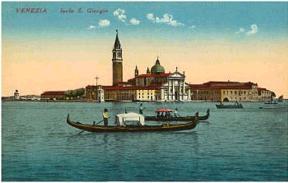 William
Dean Howells, a prominent American writer until his death in 1920, lived
with his newlywed wife in Venice from 1861 to 1865 where he filled the
post of U. S. Consul in Venice under President Lincoln.
William
Dean Howells, a prominent American writer until his death in 1920, lived
with his newlywed wife in Venice from 1861 to 1865 where he filled the
post of U. S. Consul in Venice under President Lincoln.
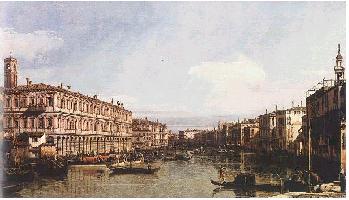 Comments
on the natural musicality of Italians
Comments
on the natural musicality of Italians
 It is
very peremptory, this audience, in its likes and dislikes, and applauds
and hisses with great vehemence. It likes best the sanguinary local
spectacular drama; it cheers and cheers again every allusion to Venice;
and when the curtain rises on some well-known Venetian scene, it has
out the scene-painter by name three times-- which is all the police
permits.
It is
very peremptory, this audience, in its likes and dislikes, and applauds
and hisses with great vehemence. It likes best the sanguinary local
spectacular drama; it cheers and cheers again every allusion to Venice;
and when the curtain rises on some well-known Venetian scene, it has
out the scene-painter by name three times-- which is all the police
permits. 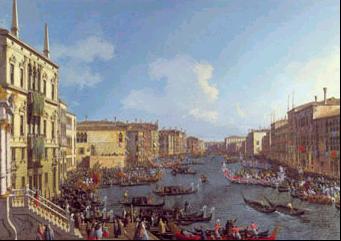 The
drama of the Marionette is of a more elevated and ambitious tone than
that of the Burattini, which exhibit their vulgar loves and coarse
assassinations in little punch-shows on the Riva, and in the larger
squares; but the standard characters are nearly the same with both, and
are all descended from the commedia a braccio (ed. WDH translates
this as Comedy by the yard, but he is describing Commedia dell'Arte)
which flourished on the Italian stage before the time of Goldoni. ...
The
drama of the Marionette is of a more elevated and ambitious tone than
that of the Burattini, which exhibit their vulgar loves and coarse
assassinations in little punch-shows on the Riva, and in the larger
squares; but the standard characters are nearly the same with both, and
are all descended from the commedia a braccio (ed. WDH translates
this as Comedy by the yard, but he is describing Commedia dell'Arte)
which flourished on the Italian stage before the time of Goldoni. ...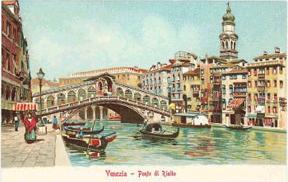 In
nearly all of Goldoni's Venetian comedies, and in many which he wrote in
Italian, appear the standard associates of Facanapa,--Arlecchino, il
Dottore. Pantalon dei Bisognosi, and Brighella. The reader is at
first puzzled by their constant recurrence, but never weary of Goldoni's
witty management of them. They are the chief persons of the
obsolete commedia a braccio, and have their nationality and
peculiarities marked by immemorial attribution.
In
nearly all of Goldoni's Venetian comedies, and in many which he wrote in
Italian, appear the standard associates of Facanapa,--Arlecchino, il
Dottore. Pantalon dei Bisognosi, and Brighella. The reader is at
first puzzled by their constant recurrence, but never weary of Goldoni's
witty management of them. They are the chief persons of the
obsolete commedia a braccio, and have their nationality and
peculiarities marked by immemorial attribution. 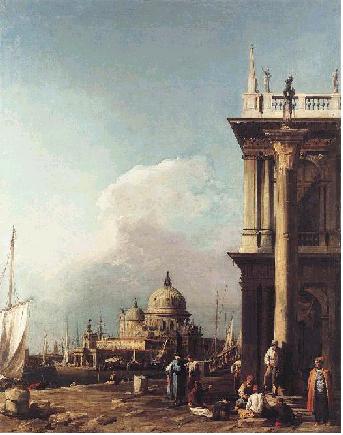 For my
own part, I find few things in life equal to the Marionette. I am never
tired of their bewitching absurdity, their inevitable defects, their
irresistible touches of verisimilitude. At their theatre I have
seen the relenting parent (Pantalon) twitchingly embrace his erring son,
while Arlecchino, as the large-hearted cobbler who has paid the
house-rent of the erring son when the prodigal was about to be cast into
the street, looked on and rubbed his hands with amiable satisfaction and
the conventional delight in benefaction which we all know.
For my
own part, I find few things in life equal to the Marionette. I am never
tired of their bewitching absurdity, their inevitable defects, their
irresistible touches of verisimilitude. At their theatre I have
seen the relenting parent (Pantalon) twitchingly embrace his erring son,
while Arlecchino, as the large-hearted cobbler who has paid the
house-rent of the erring son when the prodigal was about to be cast into
the street, looked on and rubbed his hands with amiable satisfaction and
the conventional delight in benefaction which we all know.  Comments
on the theatre of the Burattini in Venice
Comments
on the theatre of the Burattini in Venice